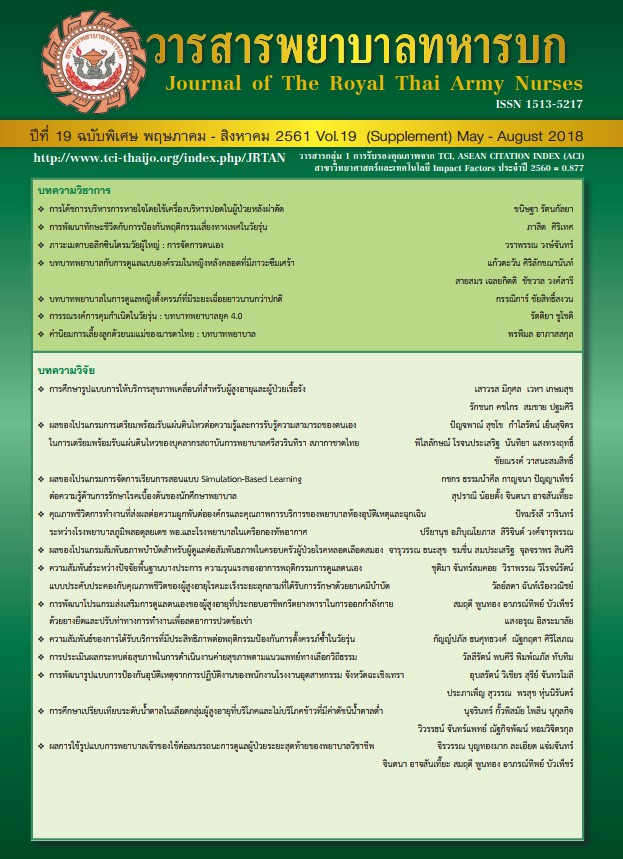Using ICT to Replace the Face to Face Seminar for Teaching and Learning in Nursing Administration
Keywords:
ICT, Face to Face Seminar, Teaching and Learning, Nursing administrationAbstract
Due to increasingly Information and Communication Technologies (ICT) advancement application in education, the descriptive research was thus developed aiming to examine satisfaction and effect of using ICT to replace the Face to Face seminar for interactive teaching and learning in Nursing Administration. Participants were graduated students studying the Master degree program in Nursing Administration at Sukhothai Thammathirat Open University. The research tool consisted of a closed-end questionnaire in discovering the students’ satisfactions; and open-ended in exploring the effective use of ICT. The tool was developed by researchers and verified by 3 experts. The content validity index was 0.83. Research findings; 1) students were satisfied with using ICT to replace face to face seminar for interactive teaching and learning in Nursing Administration at the highest level (M = 4.57, SD = 0.55 ). 2) The replacement of ICT led to the 3 following impacts on students: (1) learning skills conformed to needs in the 21st century, (2) deep learning, and (3) self-discipline and responsibility. The finding confirmed that ICT could be used as a replacement for face-to-face seminar in Nursing Administration. However, ICT application should rely on the objectives and characteristics of subjects as well as feedback process from instructors, particularly in the real time teaching.
Downloads
References
Kluwer, W. How to Get Your Nursing Students to Think Critically. Lippincott Nursing Education; 2017.
Edvardsson, I. R., & Oskarsson, G. K. Distance education and academic achievement in business administration: The case of the University of
Akureyri. The International Review of Research in Open and Distributed Learning. 2009; 9(3).
Tait, A. Student success in open, distance and elearning. The ICDE Reports Series. Norway: International Council for Open and Distance Education – ICDE; 2015.
Ledward, B. C., & Hirata, D. An overview of 21st century skills. Research and Evaluation. 2011.
Siritarungsri, B. & Suvannasamrit, C. Evaluation of the use of a webcast to support nursing learning. Journal of Nursing Science. 2011; 29(3): 36-41.
Driscoll M.P. Chapter 10 Gagné’s theory of instruction. Allyn & Bacon (ed). Learning and instruction, 2nd ed.; 2000.
Chickering, A.W., & Gamson, Z.F. Seven principles for good practice in undergraduate education. AAHE Bulletin. 1986; 39(7): 3-7.
Holly, K.A. Interdisciplinary strategies as transformative change in higher education. Innovative Higher Education. 2009; 34(5): 331-344.
Golightly, A. & Raath, S. Problem-Based Learning to Foster Deep Learning in Preservice Geography Teacher Education. Journal of Geography. 2015; 114: 58–68.
The University of Queensland. How can powerful teaching strategies and effective learning activities enhance deep learning?. Deep Learning through Transformative Pedagogy; 2018.
Pongsathonviboon, K. Lifelong Learning and Nursing Professional. Journal of The Royal Thai Army Nurses. 2016; 17(3): 1-9. (in Thai).
Downloads
Published
How to Cite
Issue
Section
License
บทความหรือข้อคิดเห็นใดใดที่ปรากฏในวารสารพยาบาลทหารบกเป็นวรรณกรรมของผู้เขียน ซึ่งบรรณาธิการหรือสมาคมพยาบาลทหารบก ไม่จำเป็นต้องเห็นด้วย
บทความที่ได้รับการตีพิมพ์เป็นลิขสิทธิ์ของวารสารพยาบาลทหารบก
The ideas and opinions expressed in the Journal of The Royal Thai Army Nurses are those of the authors and not necessarily those
of the editor or Royal Thai Army Nurses Association.






